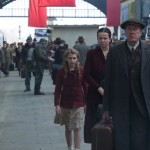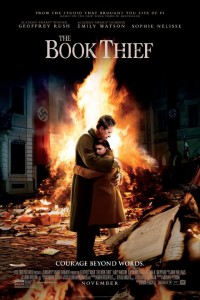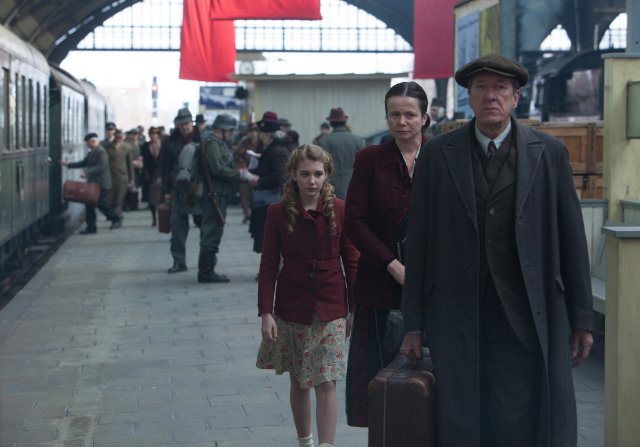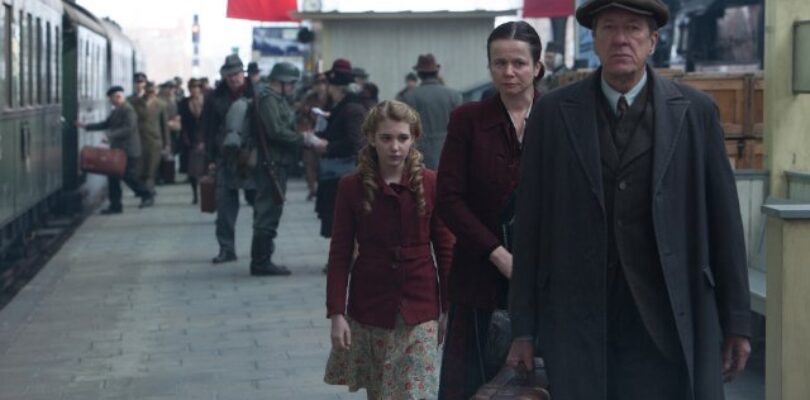
| Release Date: | November 22nd, 2013 |
| Starring: | Sophie Nelisse, Geoffrey Rush, Emily Watson |
| User Rating: | |
| Writer: | Markus Zusak (novel), Michael Petroni (adaptation) |
| MPAA Rating: | PG-13 |
| Director: | Brian Percival |
The narrator of The Book Thief is – fittingly – Death. He tells us the story of a young girl coming of age in Nazi Germany, a girl who steals books before she knows how to read. It’s the story of how, through the devotion and bravery of her foster parents and her life-changing friendship with the Jewish refugee hiding in the basement, she finds meaning and hope in the power of words. Unfortunately, despite an impeccable cast, the story fails to plumb the emotional depths of Marcus Zusak’s original story and instead treats its audience as unprepared and too easily upset by the reality of history.

Leisel Meminger (Sophie Nelisse) is 11 years old when the film begins, en route to her new foster home when her baby brother suddenly dies. A quick burial is done and when the gravediggers start to walk away, one drops a book from his pocket. The illiterate Leisel picks it up out of the snow, tucks it under her coat, and her career as a book thief has begun.
She’s left by her mother at the home of Hans and Rosa Hubermann, a house painter and a washerwoman who foster Leisel for an extra allowance from the government. Hans (Geoffrey Rush) immediately endears himself to the frightened child as a kindly father figure and teaches her to read her stolen book. Rosa (Emily Watson), on the other hand, doesn’t spare her sharp tongue for either Hans or Leisel even though she is obviously devoted to both.
One moment clearly defines both characters, beautifully acted by Watson and Rush – after a family snowball fight in their basement, Rosa grumbles, “This is the stupidest thing I’ve ever done.” To which Hans cheerfully replies, “But look how happy you are!”
Leisel eventually becomes accustomed to her new surroundings and her new family. She falls in love with books, she makes a number of friends – from the boy next door to the burgermeister’s wife – and she participates in her local Hitler Youth chapter, like any good German child. But Leisel’s life will take a dangerous turn when the Jewish Max Vandenburg lands on the Hubermanns’ doorstep.

Geoffrey Rush, Emily Watson, and Sophie Nélisse in “The Book Thief.” Photo by Photo: Jules Heath – © 2013 – Twentieth Century Fox Film Corporation. All Rights Reserved.
A movie about this particular time period is, almost without exception, automatic Oscar bait. Until the last quarter of the film, it seems to be right in that category. But at this point, particularly if you’ve read any of the novel, you’re expecting something awful and heartbreaking to happen. And don’t get me wrong, it certainly does – not really spoiling anything, it’s narrated by Death for a reason – yet it is depicted in such a way that shows writer Michael Petroni and director Brian Percival were afraid of hurting their young audience’s sensibilities. But it’s World War II. It’s Germany. It’s the Holocaust. Softening the awfulness that happens does nothing but minimize the atrocities of the time.
Overall, The Book Thief is a lovely film, pleasant even to watch these actors do the best with what they have to work with. There’s a few missteps in the mostly young cast; no matter how hard they try, not every teenager can act. But Rush and Watson make up for everything, and Nelisse at least can hold her own in the lead role. I just wish the film had been so much more than it was.[box_info]WHERE TO WATCH (powered by JustWatch)
[/box_info]

